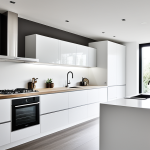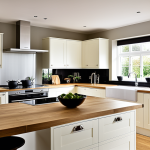Leading smart appliances in UK kitchens
The surge in smart kitchen appliances UK reflects an evolving desire for convenience and efficiency. Among the most popular devices are smart refrigerators that monitor stock levels and suggest recipes, alongside intelligent ovens that adjust cooking times based on sensor feedback. These innovations fall under broader kitchen technology trends, transforming everyday cooking.
Top brands driving this momentum include Samsung, Bosch, and Miele, each offering models equipped with Wi-Fi and app control. These top smart home brands consistently integrate features like remote monitoring and energy-saving modes, meeting both user convenience and sustainability goals. For instance, Samsung’s Family Hub refrigerator provides not only inventory tracking but also multimedia connectivity.
Have you seen this : How Are UK Kitchen Trends Shaping Home Design Choices Today?
Adoption trends in the UK show a growing interest among homeowners aged 30 to 50, a group seeking more interactive kitchen environments. Market data indicates that the integration of smart appliances has increased over 40% in recent years, largely fueled by enhanced connectivity options and improved user interfaces. This rise signals that smart kitchen appliances UK are no longer novelty gadgets, but key elements in modern kitchen design, blending technology with everyday routines seamlessly.
Integration methods for smart appliances
Integrating smart kitchen appliances UK typically involves several connectivity options, with Wi-Fi being the most common. This allows appliances to connect directly to home networks, enabling remote control and monitoring. Bluetooth is another method, often used for short-range connections between devices and smartphones or hubs. For more complex setups, dedicated hubs can centralize control by linking multiple appliances, enhancing stability and interoperability.
Also read : How is sustainable design being integrated into UK kitchens?
Voice assistants like Alexa, Google Assistant, and Apple HomeKit have become crucial in smart kitchen integration. These platforms allow users to issue verbal commands to control cooking timers, temperature settings, or check statuses hands-free. The convenience of voice control is a major factor driving adoption, particularly in busy UK households seeking seamless interaction.
For a smooth setup, it’s essential to ensure compatibility between devices and platforms. Many top smart home brands now design products with cross-platform integration in mind, enabling users to mix brands while maintaining a unified control experience. Prioritizing appliances with simple app interfaces and clear instructions also helps users overcome initial setup challenges, promoting wider adoption of smart kitchen appliances UK in daily life.
Key benefits driving adoption
Small text: Exploring why smart kitchen appliances UK are quickly becoming household essentials.
The rise in smart kitchen appliances UK is largely propelled by their undeniable kitchen convenience. These appliances reduce cooking times by automatically adjusting settings, allowing users to multitask or simply save effort during busy days. For example, intelligent ovens can preheat remotely, while refrigerators track expiry dates, preventing food waste.
Energy efficiency is another major driver. Many top smart home brands integrate sensors and adaptive power modes, contributing to energy efficient kitchens. This not only cuts electricity bills but supports broader environmental goals. Users report measurable savings after switching to appliances with smart energy management features.
Sustainable appliance use goes hand in hand with convenience and efficiency. Smart fridges, for instance, optimize cooling cycles based on content and usage patterns, minimizing unnecessary energy consumption. The benefit extends beyond cost: it marks a shift toward responsible kitchen practices.
Altogether, these benefits improve daily kitchen routines by saving time, lowering energy use, and encouraging sustainable habits. With clear practical advantages, it’s no wonder the adoption of smart kitchen appliances UK continues to accelerate.
Real-life examples and case studies
Smart kitchen transformations captured through UK homeowner stories and expert insights.
UK homeowners embracing smart kitchen appliances UK often report transformative impacts on daily life. For example, a family in London enhanced meal preparation by integrating a smart oven and refrigerator from top smart home brands like Bosch and Samsung. They highlighted benefits such as remote monitoring and recipe suggestions, making cooking both faster and more enjoyable.
Designers stress that successful smart kitchen transformations hinge on blending technology with user habits. They recommend starting with key appliances that offer intuitive interfaces and strong connectivity. This approach supports real-world usability, avoiding complex setups that overwhelm users.
Case studies illustrate a variety of smart appliance mixes customized to household needs. One kitchen combined smart lighting, voice-activated coffee machines, and Wi-Fi-enabled ovens to streamline morning routines. Another focused on energy-efficient appliances coordinated through a central hub, reflecting current kitchen technology trends prioritizing sustainability.
Collectively, these examples reveal how tailored smart solutions can elevate UK kitchens. Integrating devices thoughtfully allows homeowners to realize convenience and efficiency gains beyond mere gadgetry, creating kitchens that truly respond to modern lifestyle demands.
Regulatory and consumer considerations
Safeguarding privacy and complying with UK standards in smart kitchen appliances UK.
Understanding UK appliance regulations is crucial for manufacturers and consumers alike. Compliance ensures that smart kitchen appliances UK meet safety, energy, and electromagnetic compatibility standards mandated by British authorities. This compliance protects users and assures product reliability.
Privacy is a key concern with connected devices. Users often worry about how data from their appliances are collected and used. Addressing smart home privacy involves robust encryption and transparent data policies. Leading top smart home brands frequently include privacy features to reassure consumers, such as anonymising usage data and offering control over sharing settings.
Consumer preferences in the UK are steadily shifting toward products that balance functionality with privacy and regulatory adherence. Buyers look for appliances that integrate smoothly into existing networks while safeguarding personal information. Clear communication about data use and compliance helps build trust, encouraging wider adoption of smart kitchen appliances UK.
Ultimately, understanding regulatory frameworks and prioritising privacy align with evolving consumer preferences, ensuring that smart kitchen technologies remain both innovative and responsibly managed.



